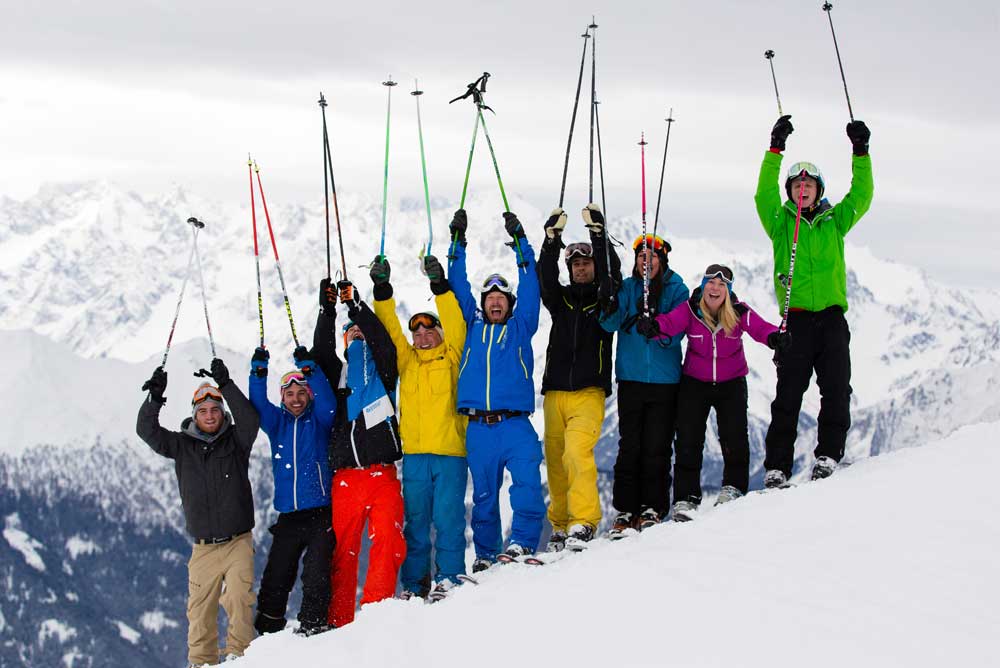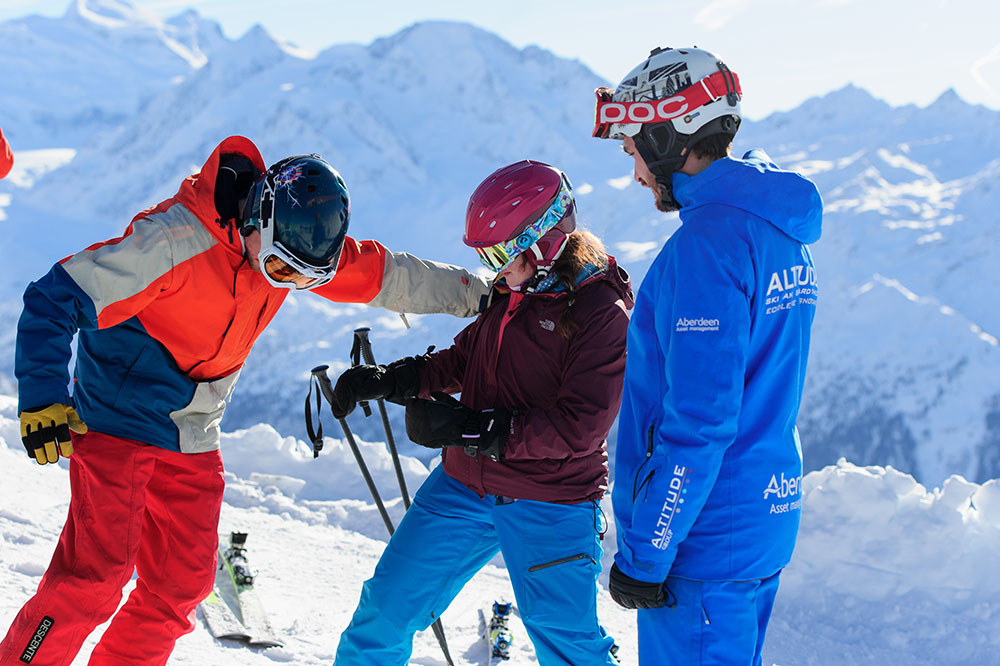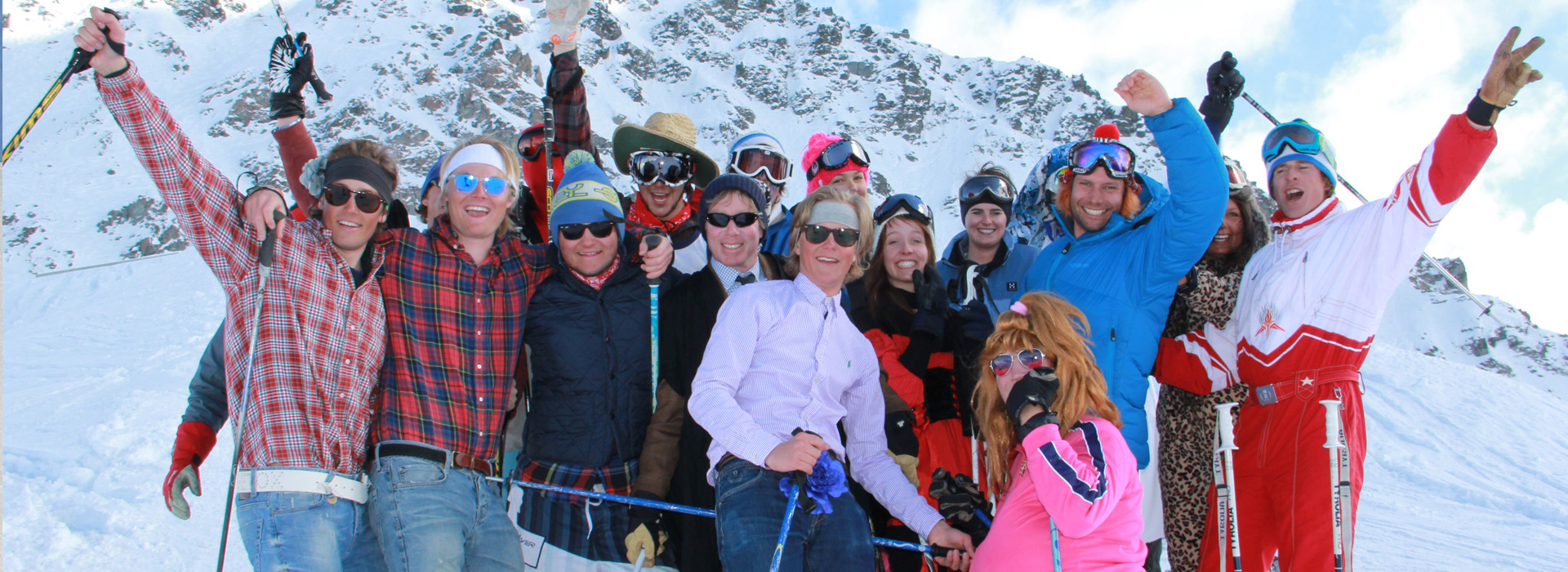If you are reading this, then you have probably either recently ticked off your level 2 qualification, are still to secure a job for next winter or you are considering embarking on a training course to progress towards your BASI 3 ski qualification.
There are currently quite a few different options available to you when progressing from the level 2 to the level 3 qualification. One approach is to secure a teaching job and progress with training in your free time which has proved a highly successful avenue for many ski instructors.
An alternative approach which seems to be increasingly popular is to embark on a season or two of training to further consolidate your skills and prepare you for future exams. Some may say this approach is lavish while others would suggest it’s an essential part of your ski teaching development.
Below we look at some of the pro’s and con’s associated with joining a seasonal training programme, to help you decide if this is the right option for you.
Structured Training
A structured training program will maximise your learning potential if you are fully committed and prepared for the journey ahead. The plan is likely to include developing the fundamentals of skiing, with a focus on the areas which are examined in the level 3 (long turns and shorts, bumps and variable snow). This will not only improve your skiing but prepare you specifically for the exam. Lots of practice time, whilst gaining direct and accurate individual feedback is likely to lead to some very big improvements in your skiing.
A Foot in the Door
It also seems to be the case that with so many skiers qualifying over the previous years , a newly qualified ski instructor without any stand out relevant experience can find it hard to get their foot in the door within a ski school. This is the case especially if they have less experience compared to other applicants and are potentially new to the resort they are applying to work in. Check out this article of what a ski school looks for in a job application for tips on your next application.
Enrolling on a course, especially one with peak week work opportunities allow you to show the ski school manager and coaches your true potential, and this is a big draw. Our courses here in Verbier very much provide a foot through the door for talented instructors to joining our full time team. Our full time team now consists of many previous trainees, with have even reached the BASI 4 and have moved to working as coaches themselves.

Shared wisdom and knowledge from being trained by an experienced coaching team
Spending time learning from experts with years of experience in the industry can be invaluable if you are looking to grow and develop as an instructor. During a winter season an experienced coach and ski school can help to share with you many of the skills that are essential in the industry and offer ongoing support to help develop your teaching to a more advanced level. In Altitude, assuming you pass the interview stage, you can expect to be teaching kids groups and lower level private and group lessons to start with (an essential journey in every ski instructors career path). Our experienced supervisors will be on hand to offer support and encouragement and tips when required and likewise if they see you excel, they’ll happily provide you work that suits your skill set.
By working with a large team, you also have a pool of teachers to ask advice, whether it’s nursery rhymes for small kids, or how to coach a nervous client down a slope in a white out, someone will be able to help you for sure.
Part Time Job
Some programs offer work, often based on passing an interview prior to this, and some don’t. Training courses not offering work may be small schools, and will promote relationships with other companies where their trainees often gain work, although here you will lose some of the advantages of receiving training support while you work as well. Some training courses are based in countries that make it difficult for Level 2’s to work, for example France, so it’s simply not possible.
Our level 3 training course in Verbier for instance allows you to enter the world of ski instructing, teaching in the peak weeks of Christmas, New Year, February Half Term and Easter. The hours would likely be between 150-200, whereas a full-time instructor who was not training might teach between 400-500 hours.

The Con’s
It’s a big financial investment
Most of the seasonal training courses out there on the market require significant investment and that’s even before you also consider the lift pass, accommodation and then the exam fees on top. With this in mind we think prior to booking onto any of these training course or exam it’s really important to consider why progressing to the level 3 is so important to you and if is it really the best option for you. A few questions to ask yourself include:
What are the reasons I want to become a BASI 3 instructor?
How many seasons do I plan to teach for?
Is this a career choice or a stop gap before I start my forever job?
Is this an important goal of mine that is worth investing in?
How much money am I prepared to invest to reach this goal?
Some of these questions are useful because the level 3 qualification, excluding the training choices you may decide on, involves at least 6 weeks of courses and exam fees, plus often travel to the exams, lift pass, and accommodation. This will all add up to over £5K so it will probably require at least two full seasons teaching at the ISIA level before you recoup the investment, if not more.
The job is not guaranteed
Be careful not to assume that doing a training course will guarantee you a job that season and in the future as there is currently no course out there offering a job without an interview. Check out this article regarding myths associated with ski instructor courses.
Ski Improvements are not guaranteed
Over the years we have trained hundreds of students for their BASI exams and over this time we have noticed that some students are able to make much bigger changes than others during the season. While we try to prepare students before and during the course as best we can, this difference can probably be explained by each person’s level of motivation and how much effort they put into the training. The coaches role is important but your own level of commitment and effort is extremely key and probably one of the biggest factors in your own success.
Altitude have been running paid ISIA courses for almost 20 years, and we currently offer both Free work and Train and paid work and Train opportunities. We have tried to be honest, open and frank in this article to help newly qualified instructors understand more about the opportunities and pitfalls available to them on their chosen career path.



